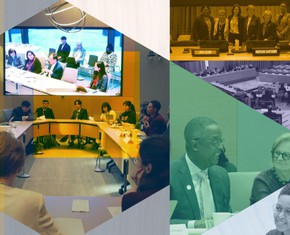The views expressed in our content reflect individual perspectives and do not represent the authoritative views of the Baha'i Faith.
Dissatisfied with the state of the world? Want to do something about it? Then write to your representative—but do it in the right spirit.
We can control some things in the world, and many actions, in collaboration with others, can accomplish a great deal to make the world a better place.
But some things are beyond us—matters that fit into the domain of law and government, such as the use of public resources, the education of children, regulation of the economy, questions of law enforcement, war, peace, etc. These require different methods, and present knotty challenges for anyone. Because so many issues have taken on such partisan baggage, Baha’is want to unite rather than divide, and to contribute constructively to the conversation rather than to just tear others down.
In many countries, we can influence our governments by writing emails and letters and making phone calls to elected officials and their staff, expressing thoughts, concerns and potential solutions about issues they have the power to address.
I am finding that this practice is a good way for me to be involved and do something positive without giving myself over to the increasingly vicious partisanship of the wider society. I have the good fortune of living in a country where many, if not most representatives genuinely care what their constituents think. It may sound strange, but it really is true. Many of them may only care because it helps them figure out what they need to do to get re-elected—but most elected representatives have at least some sense of public service, and see value in reading and hearing what their consituents think about the issues.
When I write to elected officials, I get inspiration and guidance from a wonderful Baha’i source: the book The Secret of Divine Civilization, by Abdu’l-Baha, the son of Baha’u’llah, the founder of the Baha’i Faith. It calls for a moral and social regeneration of modern states and societies, defends democracy and modern education, and recommends spiritual solutions to national and worldwide economic and political problems. It makes the case that divine religion is essential for the all-around well-being of a nation.
On its face, The Secret of Divine Civilization, originally written in 1875, addresses the people of Iran. But a number of clues throughout the text suggest that one of Abdu’l-Baha’s purposes in writing the book also involved Iran’s despotic ruler at the time, Nasiri’d-Din Shah. Abdu’l-Baha could have said any number of unflattering things about that King, who drove his family into exile and persecuted the Baha’is mercilessly. But instead, he stays on message and keeps his focus on the societal themes he intends to touch on in the book.
Take as an example this passage on the formation of a global parliament:
True civilization will unfurl its banner in the midmost heart of the world whenever a certain number of its distinguished and high-minded sovereigns — the shining exemplars of devotion and determination — shall, for the good and happiness of all mankind, arise, with firm resolve and clear vision, to establish the Cause of Universal Peace. They must make the Cause of Peace the object of general consultation, and seek by every means in their power to establish a Union of the nations of the world. They must conclude a binding treaty and establish a covenant, the provisions of which shall be sound, inviolable and definite. They must proclaim it to all the world and obtain for it the sanction of all the human race. This supreme and noble undertaking — the real source of the peace and well-being of all the world — should be regarded as sacred by all that dwell on earth. – Abdu’l-Baha, The Secret of Divine Civilization, p. 64.
Throughout the book, Abdu’l-Baha focused on the things that mattered. He wrote about a wide breadth of issues, offering some ideas that were likely to be adopted, and other ideas that turned the reader’s gaze towards more long-term possibilities. He didn’t gossip or attack the character of prominent people in politics. He wrote with the presumption that the Shah would act in good faith. He didn’t beat him over the head with a list of his errors and missteps, and he wasn’t partisan.
Abdu’l-Baha didn’t limit his suggestions to changes in law and technical adjustments—he gently drew attention first to the spiritual transformation of minds, hearts, and souls. Then he turned his sights toward material remedies. His policy preferences were informed by Baha’i principles, but he justified his ideas on the basis of reason and tangible evidence. Furthermore, he didn’t claim to represent the Baha’i community, an unwise move for anyone communicating as a private individual with someone in the Iranian government at the time.
Feel free to consider these thoughts when you write or call an elected official—but it’s probably best not to place too much emphasis on influencing the actions of politicians. Baha’is believe that the changes the world needs can only come about through the deep recognition of the oneness of humanity, the most important teaching of Baha’u’llah. Government institutions designed for an earlier era and for a divided humanity cannot easily rise to the challenges resulting from our increasing global interdependence. But there are a number of matters that could benefit from the attention of elected officials, and depending on the degree of political freedom in your country, writing an email or making a phone call asking them to do something specific could generate results.
What’s important to bear in mind is that the most beneficial thing to come from the correspondence of a citizen with an elected official may be the character of the interaction itself. If it joins a spirit of courtesy and friendliness with a spirit of justice and truth-telling, then it can sow the seeds of a better tomorrow. If it lends dynamism and harmony to the relationships between institutions, individuals, and communities, then that society’s capacity for progress can rise to a higher level.
Elected officials and the people who work for them get a lot of angry emails and phone calls—so a kind, gentle message that appeals to their noble inclinations might actually get through to them.
You May Also Like
Comments

















Many thanks for your wonderful article. I'll try and keep the Master's way in mind from now on!